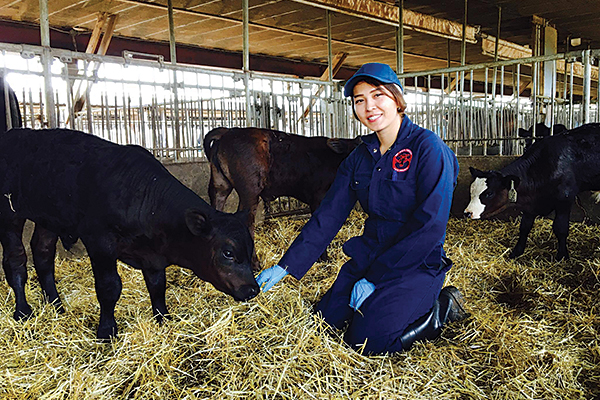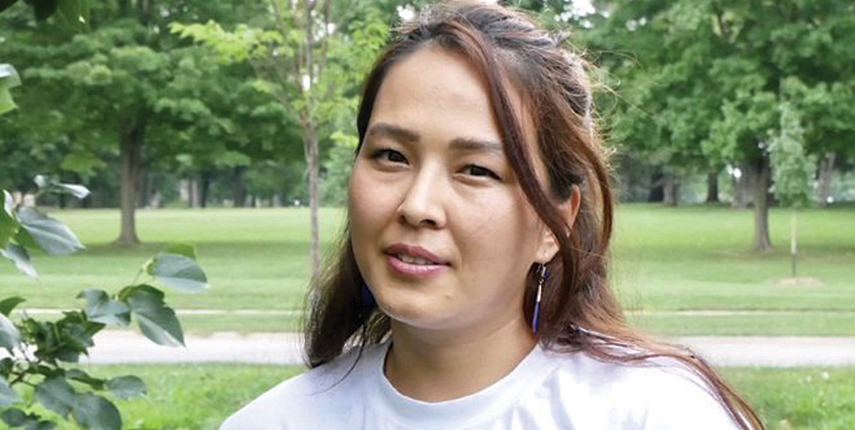Named Among BBC’s Top 100 Women for Efforts
Nasrin Husseini helps settle refugees fleeing Afghanistan.
When the Taliban returned to power in Afghanistan in fall 2021, Nasrin Husseini watched in despair as change and progress in her native country unraveled, especially for girls and women.
“I was in shock, I was distressed,” she says. Husseini, a University of Guelph grad, knows first-hand how it feels to live amid threats from the Taliban and to be barred from getting an education.
She fled Afghanistan in 2010 when it became unsafe for her to continue working as a veterinarian. Husseini eventually made her way to U of G, earning an M.Sc. in immunology in 2020. She was among the first graduate students to receive the $50,000 Arrell Food Institute scholarship. Now a research assistant in U of G’s Department of Pathobiology, she is helping transform Canada’s beef industry.
But the resurgence of the Taliban has turned her attention to her homeland, where she fears for the future of women, girls and minorities in Afghanistan. She wants to make a difference.
“Right now, because of the crisis that has happened in Afghanistan, I didn’t think for a second—I just started helping and working for Afghan refugees,” she says. Husseini volunteers with Canadian Hazara Humanitarian Services, a non profit organization. She helped the group approach Danby Products Ltd. in Guelph and get the company’s support to settle Hazara refugees in the city Earlier in Afghanistan, she advocated for the rights of women, girls and minorities, and taught English and computer skills to women. As an Afghan veterinarian, she helped farmers raise healthier animals to increase productivity and reduce treatment costs. She says Taliban threats led her at times to cease teaching or to remove her business sign from the door. Her courageous efforts were recognized recently when she was named to the prestigious BBC 100 Women list for 2021.
The BBC 100 Women includes climate activists and grassroots leaders, international CEOs and “mega-stars” playing their part to “reinvent our society, our culture and our world after the global pandemic has forced so many of us to reassess the way we live.”
Husseini was among 50 exceptional Afghan women on this year’s list, which highlighted the struggles of Afghan women and girls under renewed Taliban rule. “I admire those Afghan women who are working from inside Afghanistan,” she says.
“For me to be considered on the same list with them is a great honour. They are putting their lives in danger, and I am just working from outside the country.” Husseini was the first woman to graduate from Kabul University’s veterinary medicine program, finishing at the top of her class in 2011.
She says after the collapse of the Taliban rule in 2001, girls and women experienced some improvements in their quality of life—albeit slowly and limited—such as being allowed to go to school and work.“It wasn’t easy. We had to work very hard, but it felt so good,” she says.
“I got into veterinary school in Afghanistan when it was a huge deal for a girl to be a veterinarian.” Eventually, discrimination forced Husseini to leave Afghanistan—for the second time. As a child, she had moved with her family to Iran to escape the ongoing war. Only when the family returned to Afghanistan could she attend post-secondary education.
Husseini is Hazara, which is one of Afghanistan’s largest ethnic minorities, accounting for up to 20 per cent of the country’s 30 million inhabitants. Husseini says the Taliban has a long history of violence and oppression toward the Hazara.

Since its return to power in 2021, conditions for the group and for women and girls in general have rapidly worsened, she says. Many people in the country have fled or gone into hiding. In late March, the Taliban closed girls’ high schools after having reopened them almost seven months earlier. Husseini said she feels “so blessed, so happy” to be working at U of G and living in nearby Kitchener.
“Finally, I am in a safe place that I can call home.
I love my work. I love working with animals,” she says. “But now my main concern is for the women and girls of my country and for the Hazara. Everyone is so upset, so afraid. Many are now in hiding. They are really in danger.” Husseini sees an opportunity for the Canadian government to assist Afghan refugees currently living in Iran—many of them academics with graduate degrees—to come to Canada, as well as minorities that fled Afghanistan and are now in a second country.
She plans to continue her advocacy. “With this BBC recognition, I think the weight is heavier on my shoulders, and I have to do more. People are counting on me.”
